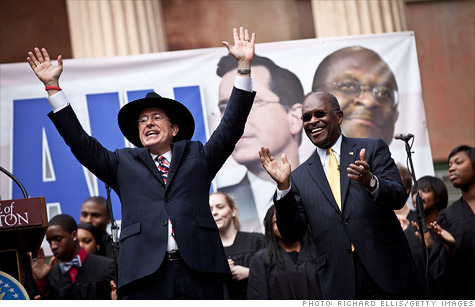
Stephen Colbert on the campaign trail.
NEW YORK (CNNMoney) -- Is Stephen Colbert a comedian, political candidate or professor of campaign finance law?
At times, the answer is all three.
Colbert has spent the better part of a year using his show on Comedy Central to take viewers on a tour of the opaque world of campaign finance law.
In June, Colbert created his own political action committee, a super PAC called Americans for a Better Tomorrow, Tomorrow.
In order to do that, Colbert had to petition the Federal Election Commission for an exemption that would keep him from running afoul of disclosure rules that Viacom, the parent company of Comedy Central, hoped to avoid.
The FEC -- yes, the real body -- ruled five to one in Colbert's favor. (Where the money is: A campaign spending primer)
"There will be others who say 'Stephen Colbert, what will you do with that unrestricted super PAC money?' " Colbert told a crowd outside the hearing. "To which I say, I don't know. Give it to me and let's find out."
Armed with the ability to accept unlimited sums of money from corporations, unions, associations and individuals, Colbert's super PAC set about doing pretty much what other super PACs do: spending unlimited sums to overtly advocate for or against political candidates.
Americans for a Better Tomorrow, Tomorrow ran ads in advance of the Iowa straw poll touting the candidacy of "Rick Parry."
The super PAC has targeted other candidates along the way. And the super PACs supporting those candidates have been busy as well.
Super PACs have spent $35.4 million on the 2012 presidential race, according to federal campaign disclosures, including $11.4 million on last Saturday's South Carolina Republican primary and $6.4 million on next week's contest in Florida.
As Colbert navigates the world of campaign finance, he has been accompanied by Trevor Potter, a former FEC commissioner and chairman who also served as John McCain's general counsel.
The affable lawyer plays the straight man to Colbert's over-the-top character, laying out campaign finance law in plain language as Colbert salivates over the possibilities.
In one episode, Colbert enlists Potter to create a tax-exempt 501(c)(4) so that he can obtain secret donations in a "completely transparent" way.
"Can I take this (c)(4) money and donate it to my super PAC?" Colbert asked after signing paperwork that registered the shell corporation in Delaware.
"You can," Potter said. The camera then cuts to Colbert, whose face displayed a look of total shock. "Wait," Colbert said. "What is the difference between that and money laundering?"
Advocates of campaign finance reform describe moments like that as invaluable.
"I think it's enabled a different kind of conversation at a whole new level," said Meredith McGehee, policy director at the Campaign Legal Center, a group founded by Potter. "It's a whole new medium for explaining how ridiculous this system is."
Richard Briffault, a professor at Columbia Law School, said the attention Colbert is paying to the issue is, overall, a good thing.
"He is performing a public service by bringing this issue to a wider audience," Briffault said. "At the same time, it's a pretty serious matter. It's not a joke."
Briffault said that Colbert's step out from the shadows of satirical critique and into the actual process could be problematic. After all, Briffault said, it's easy to imagine a prominent media figure running for office.
"This has made a lot of people very nervous," said McGehee. "But we've been talking about these issues for so many years and have failed to engage the broader audience."
The show's writers show no signs of fatigue. (International campaign finance: How do countries compare?)
In a development that required some legal gymnastics, Colbert passed control of his super PAC to colleague Jon Stewart after deciding to form an exploratory committee, a stepping stone to a presidential run.
Stewart renamed the super PAC the "Definitely Not Coordinating With Stephen Colbert Super PAC."
The maneuver now allows the show to poke fun at regulations that prohibit "coordination" between super PACs and the candidates they support.
Colbert hit the trail in South Carolina, while Stewart and the super PAC ran ads that referred to Mitt Romney as "Mitt the ripper."
"If Mitt Romney really believes corporations are people," the ad said, "then Mitt Romney is a serial killer."
In an interview on ABC, Colbert disavowed any prior knowledge of the ad, despite the involvement of his friend and business partner.
"I had nothing to do with that ad. I have no control over that ad," Colbert said. "I am not calling anybody a serial killer. I can't tell Americans for a Better Tomorrow, Tomorrow what to do. It's not my super PAC."
Both Briffault and McGehee wouldn't hazard a guess when asked which part of campaign finance law Colbert might tackle next, but both said his brand of humor was drawing in an audience that might otherwise not care.
"It's really hard to get people to focus on these issues," McGehee said. "A lot of times you just get dismissed as those goo-goos." ![]()
| Overnight Avg Rate | Latest | Change | Last Week |
|---|---|---|---|
| 30 yr fixed | 3.80% | 3.88% | |
| 15 yr fixed | 3.20% | 3.23% | |
| 5/1 ARM | 3.84% | 3.88% | |
| 30 yr refi | 3.82% | 3.93% | |
| 15 yr refi | 3.20% | 3.23% |
Today's featured rates:
| Latest Report | Next Update |
|---|---|
| Home prices | Aug 28 |
| Consumer confidence | Aug 28 |
| GDP | Aug 29 |
| Manufacturing (ISM) | Sept 4 |
| Jobs | Sept 7 |
| Inflation (CPI) | Sept 14 |
| Retail sales | Sept 14 |